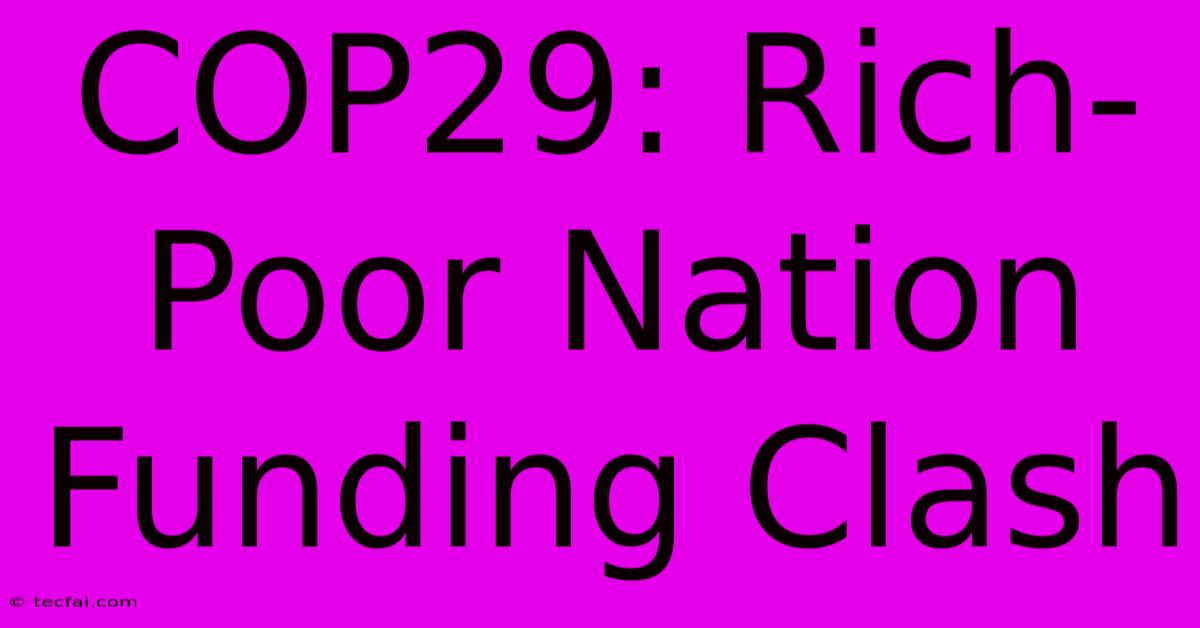COP29: Rich-Poor Nation Funding Clash

Discover more detailed and exciting information on our website. Click the link below to start your adventure: Visit Best Website tecfai.com. Don't miss out!
Table of Contents
COP29: Rich-Poor Nation Funding Clash – A Climate of Discord?
The annual Conference of the Parties (COP) climate summits are often described as the world's last best hope for tackling climate change. However, COP29, like its predecessors, is shaping up to be a battleground, with a significant clash brewing over funding between wealthy and developing nations. This deep-seated disagreement threatens to derail progress on crucial climate action initiatives.
The Core Issue: Unfulfilled Promises and Growing Demands
At the heart of the conflict lies the persistent failure of wealthier nations to meet their financial commitments to developing countries. These commitments, primarily focused on providing financial and technological assistance to help them adapt to the effects of climate change and transition to cleaner energy sources, remain largely unmet. Developing nations, disproportionately vulnerable to the impacts of a changing climate despite contributing the least to the problem, are demanding more substantial and reliable funding.
The North-South Divide Deepens
This isn't merely a matter of numbers; it's a question of trust. Years of broken promises have eroded the confidence of developing nations in the willingness of wealthier countries to shoulder their responsibility. The historical context is crucial: the industrialized nations are primarily responsible for the greenhouse gas emissions that have driven climate change, yet developing nations are bearing the brunt of the consequences. This historical inequity forms the bedrock of their demands for significantly increased financial aid.
Beyond the Numbers: The Complexity of Climate Finance
The conversation around climate finance goes beyond simple monetary figures. It encompasses:
- Adaptation Finance: Funding for projects that help vulnerable communities adapt to the already unavoidable impacts of climate change, such as sea-level rise, extreme weather events, and drought. This often includes building resilient infrastructure and developing early warning systems.
- Mitigation Finance: Funding for projects that reduce greenhouse gas emissions, such as transitioning to renewable energy sources, improving energy efficiency, and protecting and restoring forests.
- Loss and Damage Finance: This is a relatively new and highly contentious area. It focuses on providing financial assistance to developing nations for the irreversible losses and damages they suffer due to climate change impacts that cannot be adapted to. This includes compensating for the destruction of infrastructure, livelihoods, and ecosystems.
The Challenges of Transparency and Accountability
Another significant hurdle is the lack of transparency and accountability in the existing climate finance mechanisms. Developing countries often struggle to access the promised funds, and the tracking and reporting of these funds are frequently inadequate. This opaqueness fuels distrust and undermines the effectiveness of these crucial financial flows.
Potential Outcomes and Paths Forward
The outcome of this funding clash at COP29 remains uncertain. Several potential scenarios are possible:
- A Breakthrough Agreement: A commitment from wealthy nations to significantly increase their financial contributions, accompanied by greater transparency and accountability mechanisms, could lead to a breakthrough. This would require a substantial shift in political will and a recognition of the moral and ethical imperative to support vulnerable nations.
- Stalemate and Continued Disappointment: A failure to reach a meaningful agreement would likely result in increased frustration among developing nations and hinder progress on global climate action. This could lead to a further erosion of trust and make future negotiations even more challenging.
- Incremental Progress: A more likely scenario might involve some incremental progress, with commitments to increase funding but without addressing the deeper systemic issues of transparency and accountability. This would provide a limited but insufficient solution, leaving the core issues unresolved.
Moving Forward: A Call for Collaborative Action
Resolving this funding clash requires a fundamental shift in approach. It necessitates a genuine commitment from wealthy nations to meet their responsibilities and build trust with developing countries. Transparency, accountability, and equitable partnerships are crucial for forging a path toward effective climate action. The future of global climate efforts hinges on addressing this crucial funding imbalance at COP29 and beyond. Failure to do so will severely hamper the global community's ability to effectively combat climate change.

Thank you for visiting our website wich cover about COP29: Rich-Poor Nation Funding Clash. We hope the information provided has been useful to you. Feel free to contact us if you have any questions or need further assistance. See you next time and dont miss to bookmark.
Featured Posts
-
Davis Missed Free Throws Lakers News
Nov 23, 2024
-
California Earthquake 3 8 Magnitude Tremor
Nov 23, 2024
-
Nikita Hands Assault Case Verdict In
Nov 23, 2024
-
Zarys Tiebreaker Lifts Flames Past Rangers
Nov 23, 2024
-
Dublin Hotel Assault Mc Gregor Jury Case
Nov 23, 2024
